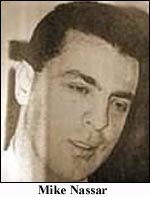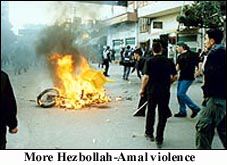Jointly published by the United States Committee for a Free Lebanon and the Middle East Forum
Intelligence Briefs: Lebanon
Amal-Hezbollah Clashes Injure 60
3 Jailed for Israel Contacts
Former LF Official Assassinated
6 Die in Alleged Hezbollah Raid
Under Pressure, Jordan Releases Detained Hezbollah militants
Amal-Hezbollah Clashes Injure 60
An estimated 60 people were injured during street clashes between supporters of the rival Shi'ite Amal and Hezbollah movements on March 23, the eve of the holiday of Ashoura. The violence was reportedly triggered by Amal supporters, who claimed that Hezbollah's procession was deliberately slowed down to block their own and began hurling rocks and bottles. The fighting escalated for two hours until army units closed off the main square and dispersed the combatants. An army officer, three soldiers and two Red Cross members were also wounded in the clashes.
Members of the two movements have clashed regularly in recent months. On March 13, a brawl erupted between students affiliated with the two groups at the Lebanese University's Faculty of Sociology. On February 1, a fight erupted between Amal and Hezbollah members over the use of a soccer field, injuring four of the participants and five Lebanese soldiers who intervened. 3 Jailed for Israel Contacts
A Lebanese military tribunal sentenced three anti-Syrian Christian activists on charges of having illegal contacts with Israel and forming a group to undermine the state's authority on March 19, triggering vehement protests from Christian political leaders. Toufic Hindi, a former advisor to jailed Lebanese Forces (LF) leader Samir Geagea, and Habib Younis, the former Beirut bureau chief of the London-based daily Al-Hayat, were each sentenced to three years in prison with hard labor, while Antoine Georges Bassil, a former journalist for the Saudi-owned London-based Middle East Broadcasting Corporation (MBC), was given four years with hard labor. All three were arrested in August 2001 [see An Israeli-LF Plot? in the September 2001 issue of MEIB] and two made confessions that they later said were extracted under torture.
The Qornet Shehwan Gathering, a loose coalition of mainstream Christian politicians, condemned the sentences as part of a "government plan to strike against all opposition groups."
 |
Former LF Official Assassinated
A Lebanese business tycoon and former member of the Lebanese Forces (LF) militia was assassinated along with his wife in Sao Paulo, Brazil on March 7, the second assassination of a high-ranking LF official this year [see The Assassination of Elie Hobeika in the January 2002 issue of MEIB]. Nassar, 39, and his wife, Marie Noel Mimassi, 31, were driving when a bullet punctured the right rear tire of their car. After stopping at a gas station to get the flat tire repaired, a masked gunman pulled in and shot both of them using a silencer-equipped pistol.
Nassar, a native of Kfar Qatra in the mountainous Shouf region, had an estimated net worth of over $100 million and was the third-largest shareholder in the Solidere real estate company after Prime Minister Rafiq Hariri and MP Nabil Bustani. He also had vast real estate holdings throughout Lebanon, including the villa of former President Camille Chamoun in Deir al-Kamar and Hobeika's villa in Adma.
Sao Paolo police officials said they were "almost certain" that revenge was the motive. Nassar is said to have stolen money from the proceeds of LF weapons sales to the Balkans shortly after the end of the war in Lebanon. He distributed some of the proceeds to his uncle, South Lebanon Army (SLA) Commander Antoine Lahad, and several other LF officials, keeping the remainder for himself. However, when the head of Syrian military intelligence in Lebanon, Maj. Gen. Ghazi Kanaan, found out about it, Nassar was forced to pay Kanaan $25 million in return for safe passage out of the country. It is likely that, because of his sudden departure and hefty exit fee, somebody who was promised a share of the LF weapons spoils did not receive his share. In 1996, Nassar returned to Lebanon to run for a parliamentary seat, but was forced to withdraw from the race under what the Lebanese daily Al-Nahar called "mysterious" conditions. 6 Die in Alleged Hezbollah Raid
On March 12, two guerrillas crossed from Lebanon into northern Israel and opened fire with automatic weapons and grenades on passing cars, killing five civilians and an army officer and wounding seven before they were hunted down and killed by Israeli soldiers. According to Israeli military officials, the gunmen used a specially-constructed ladder (subsequently recovered by Israeli soldiers) to climb over the electric security fence without being detected.
Although the identity of the assailants has not yet been determined, Israeli investigators have said that Hezbollah assisted the attackers in scaling the fence. Significantly, representatives of UNIFIL, the UN peacekeeping force in south Lebanon, have not cast serious doubt on the claim. Israel has not retaliated for the attack, but sent a message to Syria through the United States warning that another attack across the border will not be tolerated. "I think that the Israelis have been so abnormally quiet about it because they know just how grave a situation they could be getting into," said a UNIFIL official interviewed by The Daily Star (Beirut) on March 27.
Under Pressure, Jordan Releases Detained Hezbollah militants
According to a report by the daily Al-Ra'y (Amman) on March 7, Jordan's State Security Court released three members of Hezbollah, who had been detained since November for attempting to smuggle weapons into the West Bank. Syrian and Lebanese officials had been pressing for their release for weeks, fearing that a trial of the suspects would unveil the scope of Hezbollah arms shipments to Palestinian terrorist groups.
� 2002 Middle East Intelligence Bulletin. All rights reserved.
MEIB Main Page


